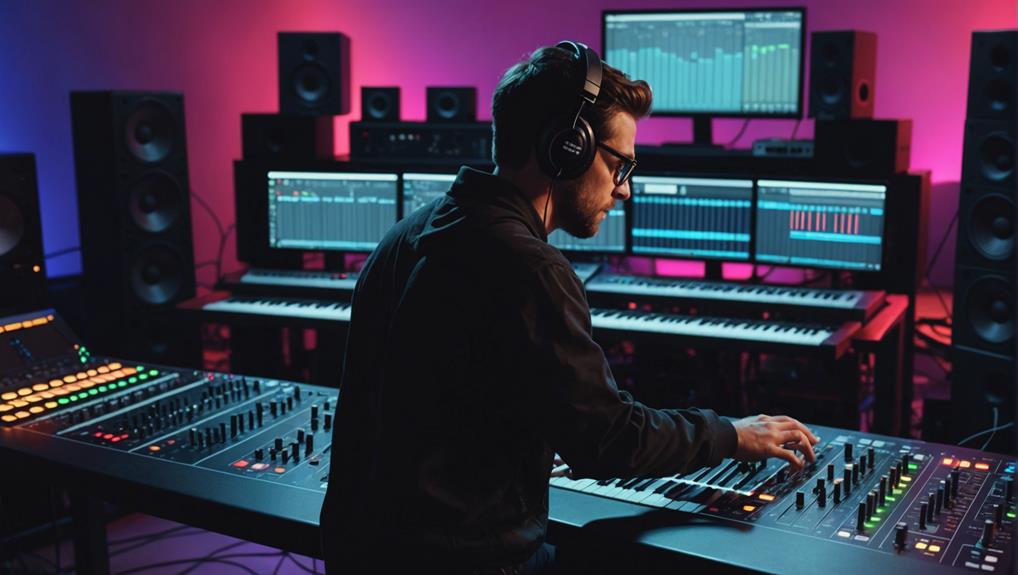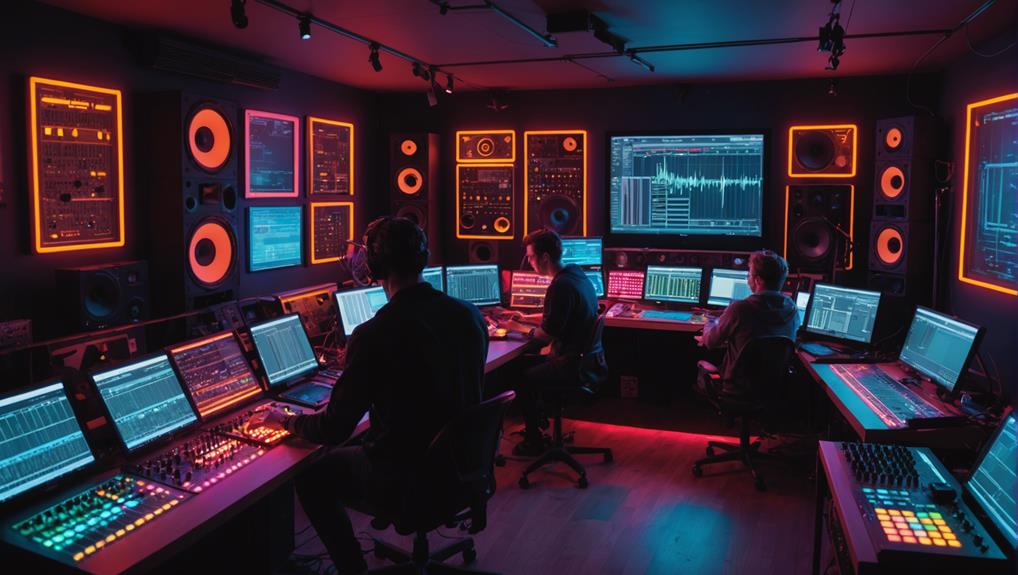No products in the cart.
Record labels play a vital role in shaping your journey through electronic music. They invest in your development as an artist, providing you with high-quality equipment and career guidance to enhance your creative skills. By setting production standards, they guarantee your work not only meets but surpasses technical expectations, influencing mixing, mastering, and overall sound quality. Your collaborations expand as labels create networks and foster cross-genre projects. They also curate what gets popular, influencing consumer preferences through targeted promotions and strategic marketing. With their help, you’re not just making music; you’re exploring a global stage. Explore further to grasp the full extent of their influence.
Key Takeaways
- Record labels fund artist development, enhancing skills and production quality in electronic music.
- They set production standards, ensuring high-quality mixing and mastering.
- Labels drive collaborations, providing studios and networking opportunities for electronic artists.
- Marketing strategies by labels shape consumer preferences and determine track popularity.
- Labels expand global reach, securing international tours and influencing live performance trends.
Defining Electronic Music Genres
Electronic music genres, ranging from techno and house to dubstep and drum and bass, are defined by their use of synthesized sounds, repetitive beats, and digital manipulation. As you explore further into this domain, you’ll notice how subgenres like ambient, trance, and future bass further diversify the electronic music landscape, each exploring sonic experimentation in unique ways.
Analyzing genre evolution within electronic music reveals a dynamic interplay of technology and creativity. The development of new software and hardware continuously pushes the boundaries, allowing you to investigate and create sounds that were once unimaginable. This technological progression isn’t just about louder bass or clearer treble; it’s about how these tools can be manipulated to forge new sonic textures and rhythms.
The overlap and evolution of these genres reflect an ever-changing tapestry of musical expression. For instance, the emergence of future bass showcases how elements from older genres can be reimagined into something entirely new, often incorporating wider emotional ranges and complex chord structures. This ongoing evolution is a tribute to the genre’s resilience and capacity for reinvention, keeping you and other enthusiasts perpetually engaged and excited for what might come next.
Supporting Artist Development
As you explore the role of record labels in electronic music, it’s essential to recognize how they underpin artist development. By funding talent growth, labels provide not just financial support but also a platform for artists to amplify their reach and refine their skills.
They also offer career guidance and foster environments that encourage creative experimentation, enabling artists to push the boundaries of their musical expression.
Funding Talent Growth
Record labels heavily invest in the development of artists within the electronic music scene, providing the financial means necessary for both creative and professional growth. This support is vital in funding innovation and empowering creativity, essential elements in the dynamic world of electronic music.
- Investment in High-Quality Equipment: Enables you to access state-of-the-art technology to push the boundaries of sound.
- Enhanced Production Quality: Supports refined, professional soundscapes that stand out in the competitive market.
- Collaborative Opportunities: Facilitates partnerships with other talented artists and producers, expanding your creative horizons and networking reach.
This strategic financial backing not only enhances your artistic capabilities but also guarantees your music evolves, keeping pace with industry trends and audience expectations.
Providing Career Guidance
Beyond the financial backing, labels also play a pivotal role in providing career guidance to help you navigate the complexities of the electronic music industry. This mentorship is essential as you aim for career advancement. Your label can connect you with influential industry figures, opening doors to collaborations that might’ve been out of reach. These industry networking opportunities are priceless, providing you with insights and exposure that are crucial for your growth.
Through strategic planning and support, your label will guide you in making decisions that shape your career trajectory, ensuring each step contributes to your long-term success. They’re not just backing your current projects; they’re investing in your future, helping you to build a sustainable career in this ever-evolving industry.
Enhancing Creative Skills
Labels greatly enhance your creative skills by offering a range of resources, mentorship, and platforms that support your artistic development. By teaming up with a record label, you’re not just gaining support; you’re initiating a journey of creative empowerment and skill enhancement. This environment nurtures your artistic growth and encourages innovative expression, allowing you to advance the boundaries of electronic music.
- Guidance and Mentorship: Expert insights help refine your sound and artistic vision.
- Resource Access: State-of-the-art tools and technology at your disposal.
- Collaborative Opportunities: Work with other talented artists to explore new creative landscapes.
This structured support helps you evolve your craft continuously, ensuring that your musical contributions are both unique and impactful.
Influencing Production Standards
Establishing rigorous quality benchmarks, record labels profoundly influence the production standards of electronic music, ensuring that artists not only meet but often surpass prevailing technical specifications and industry trends. You’ll find that this industry influence isn’t just about adhering to norms; it’s about leading in sound evolution. By setting such high standards, labels push you to explore new sonic territories, enhancing the overall quality and appeal of your music to a broader audience.
Record labels’ commitment to excellence plays a pivotal role in shaping the sound and production quality of electronic music. This is not just about meeting the bare minimum; it’s about exceeding expectations and setting new industry benchmarks. Here’s how labels typically impact production:
| Aspect | Function | Impact on Artist |
|---|---|---|
| Mixing | Ensuring clarity and balance of sound | Enhances sonic quality |
| Mastering | Achieving loudness and polish | Improves final output |
| Feedback | Providing critical technical insights | Refines and sharpens artist skills |
| Resource Allocation | Access to top-tier production tools and spaces | Facilitates high-quality productions |
| Trend Setting | Introducing and enforcing new sound standards | Keeps music relevant and trending |
Through this structured and strategic influence, labels not only maintain but also raise the standards of electronic music production, ensuring you’re always at the cutting edge of innovation and quality.
Driving Collaboration Opportunities
While record labels set high standards in production, they also play a pivotal role in fostering collaborations that bring artists together to explore new musical landscapes. By connecting you with a network of producers, DJs, and other artists, labels facilitate opportunities that might otherwise be inaccessible. This environment is vital for fostering community connections, and it lays the groundwork for creative synergy that pushes the boundaries of what electronic music can be.
When you’re part of a label, you’re more than just an individual artist; you’re a part of a dynamic ecosystem that encourages experimentation and exploration. Here are some key ways labels drive these opportunities:
- Resource Sharing: Access to high-quality studios and cutting-edge technology.
- Networking Platforms: Events and meetups that bring together diverse artists.
- Cross-Genre Projects: Opportunities to blend different styles and innovate.
This collaborative spirit championed by labels guarantees that electronic music remains a progressive and ever-evolving genre. By breaking down barriers between different musical styles and cultures, labels not only enhance your creative potential but also enrich the entire music community with fresh, innovative soundscapes.
Shaping Consumer Preferences
As you explore the electronic music landscape, consider how record labels play a pivotal role in curating genre popularity. They’re not just influencing which tracks you come across on popular playlists, but also guiding the promotion of artists, shaping your musical tastes more than you might realize.
This strategic manipulation not only dictates market trends but also impacts the diversity and reach of music that gets to your ears.
Curating Genre Popularity
Record labels greatly influence electronic music’s appeal by strategically marketing and promoting specific genres to shape consumer preferences. You’ve likely noticed how certain electronic music styles suddenly become ubiquitous, a trend largely orchestrated by labels. Their expertise in genre curation and audience engagement allows them to tailor their strategies to resonate deeply with listeners.
Here’s how they do it:
- Collaborations: Teaming up with influential artists and DJs to spotlight emerging genres.
- Targeted Campaigns: Launching marketing initiatives that align with cultural trends and listening habits.
- Distribution Channels: Leveraging streaming platforms and social media to maximize exposure.
Through these methods, labels not only promote specific genres but also guide the evolution of electronic music, keeping it dynamic and fresh.
Influencing Playlist Selections
Playlist curation by labels strategically shapes your musical tastes, subtly guiding you towards specific electronic music genres and artists. This deliberate placement not only enhances artist exposure but also plays a crucial role in genre promotion.
By featuring certain tracks prominently, labels guarantee these sounds become part of your regular listening habits, greatly influencing your preferences. This manipulation isn’t just about what’s new; it’s about creating a demand for certain styles, thereby steering the market.
As you engage with these playlists, your exposure to curated content doesn’t just introduce you to new music—it molds your musical landscape. Consequently, labels’ control over playlist selections on platforms like Spotify and Apple Music can dictate the direction of electronic music trends, profoundly affecting listener engagement and shaping the industry’s future.
Guiding Artist Promotion
While major labels deploy an array of promotional tools from billboards to TV spots, shaping your musical tastes, independent labels often find themselves at a disadvantage due to their more limited resources. These big labels’ strategies influence what becomes popular in electronic music, impacting everything from your playlist choices to live show lineups.
To understand the dynamics, consider:
- Label partnerships: Major labels collaborate extensively, leveraging each other’s strengths to amplify their reach.
- Promotion strategies: They employ thorough campaigns across multiple platforms.
- Consumer influence: Their promotional power shapes your preferences more than you might realize.
You’re experiencing a music landscape meticulously crafted by these promotion strategies, driven by label partnerships that decide not just what’s available, but what’s popular.
Managing Marketing and Promotions
In managing marketing and promotions, major record labels leverage their vast resources to dominate visibility in the electronic music market. They deploy sophisticated marketing strategies, utilizing a blend of traditional media and modern platforms like social media to engage audiences globally. Their ability to trend on social media isn’t just about posting content; it’s a strategic operation involving timed releases, exclusive previews, and coordinated posts across various platforms, ensuring maximum engagement.
You’ll find that these major labels have unrivaled networking capabilities. Their industry connections aren’t merely extensive; they’re influential. This network includes not just media contacts but also ties with influential playlist curators and radio stations, which can dramatically increase an artist’s visibility. These connections are often the gateway to high-profile collaborations and opportunities that can define an artist’s career.
On the other hand, independent labels often adopt grassroots marketing strategies. Without the same financial muscle, they lean heavily on community engagement and direct artist-fan interactions. While these methods can forge strong, loyal followings, the scope and speed of growth they can achieve are typically much more limited compared to their major counterparts.
Facilitating Global Reach
Record labels wield their extensive distribution networks to thrust electronic music artists onto the global stage, ensuring their sounds reach ears in every corner of the world. By leveraging their connections and promotional resources, these labels not only enhance global exposure but also pave the way for lucrative brand partnerships.
Here’s how labels amplify your reach globally:
- Streaming and Radio Placements: They secure spots on major streaming services and radio stations worldwide, making your music accessible to a broad audience.
- International Tours and Festival Bookings: Labels coordinate tours and secure spots at leading festivals, opening doors to live performances in front of international crowds.
- Targeted Marketing Strategies: They tailor marketing campaigns to resonate across different demographics and regions, building a diversified fan base.
This strategic positioning is essential, as it allows you to tap into markets you mightn’t have accessed on your own. The visibility gained through these channels isn’t just about numbers; it’s about creating a brand identity that resonates globally. By aligning with a record label, you’re not just releasing music; you’re crafting a presence on the world stage, ensuring your sound not only travels but thrives across borders.
Encouraging Technological Innovation
Harnessing technological innovation, record labels greatly enhance the creative landscape of electronic music by fostering partnerships with tech companies to develop new production tools and software. These tech partnerships aren’t just about pushing the boundaries; they’re about rewriting the rules of what’s possible in music. By investing in experimental tools, record labels empower you, the artist, to explore new domains of creativity. You’re given access to cutting-edge resources that enable you to manipulate sound in ways previously unimaginable.
The commitment to innovation extends beyond just hardware. Record labels are pivotal in integrating advanced technologies like AI music composition and virtual reality into the production process. This isn’t just about adopting new tech; it’s about creating a whole new experience both for you as the creator and for your audience. The focus is on pioneering techniques that enhance your creative freedom and expression.
Impacting Live Performance Trends
Through their substantial support for tours, stage productions, and promotional efforts, record labels greatly influence the trends in live electronic music performances. By infusing capital and expertise into these areas, labels guarantee that artists aren’t just heard but seen, in ways that resonate deeply with fans. This support is vital for enhancing audience engagement, important in an era where live experiences are as valued as the music itself.
Here are some ways record labels shape live electronic music scenes:
- Resource Allocation: Labels invest in cutting-edge stage designs and sound systems that transform standard live shows into engaging, multisensory experiences.
- Strategic Partnerships: Collaborations with festival organizers and venue owners help secure premium performance slots, increasing visibility for artists.
- Curating Diversity: Labels advocate for performance diversity, ensuring a mix of genres and artists that attract and maintain diverse audiences.
This strategic involvement enables labels to not just influence musical trends but also to sculpt the live electronic music landscape. They create environments where artists can experiment and engage with their audiences in innovative ways, thereby broadening the appeal and impact of electronic music across various demographics.
Frequently Asked Questions
How Do Record Labels Affect Music?
Record labels shape your music career through artist development and contract negotiations, offering resources for growth but often demanding significant control over your output, which can impact your creative freedom and financial returns.
How Did Electronic Music Change the Music Industry?
Electronic music fundamentally altered the industry, driving genre evolution and enhancing artist autonomy. You’ve seen firsthand how it shifted music creation from traditional modes to innovative, electronically-driven processes.
What Is Electronic Music Influenced By?
You’re influenced by cultural trends and technological advancements in electronic music, shaping it through disco, funk, and club scenes while new sounds and global festivals continuously redefine its boundaries and audience reach.
What Are Two Impacts That Digital Music Has Had on the Music Recording Industry?
Digital music has democratized the industry, enhancing artist empowerment by enabling direct fan engagement and diversified revenue streams through streaming and downloads, though it’s also intensified competition and reduced per-stream earnings.
Conclusion
As you’ve seen, record labels are crucial in shaping electronic music. They don’t just develop artists; they set production standards and drive technological innovation.
By managing marketing and orchestrating collaborations, labels influence your musical tastes and experiences. They guarantee that electronic music reaches a global audience and continually evolves, impacting live performances and consumer preferences.
Ultimately, the role of record labels in electronic music is extensive, steering its progression and cultural footprint.




